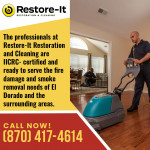During the winter months, some homeowners try to save money on their heating bills by utilizing electric space heaters. But, if the appliance is not operated safely, fire damage could occur. Heating equipment is the second leading cause of house fires, behind cooking and ahead of electrical malfunctions. Here are some safety tips for using a space heater without causing fire damage.

Tip #1: Choose the right space heater for the area to be heated
Assess the heating needs and match the device to the need. Consider the following questions:
- Is the unit for additional heating for a cooler room?
- Will the unit be used for emergency heating in case the primary heating source is out of commission?
The heating appliances are sometimes used to heat a single room and at other times to heat the entire home. In compact spaces, a space heater is both effective and economical. Whether the living space to be heated is large or small, the homeowner should exercise caution while using these devices.
Tip #2: Choose the safest space heater for the situation
Portable heaters that burn natural gas, propane, or kerosene have more risk hazards than electric space heaters. All fuel-burning models require ventilation, such as a slightly opened window or door, to let in the fresh air. Never use a gas-fueled or kerosene heater in a confined living space; the consequences could be deadly. A smoke detector and carbon monoxide detector are essential for adequate safety. Some fuel-fired space heaters are unvented. Since 1983, these appliances have been required to have an oxygen depletion sensor (ODS) which shuts off a unit if oxygen levels in the vicinity of the heater drop below a certain level.
Select a heating device that is approved by a nationally recognized testing laboratory. Underwriters Laboratories (UL) is the most recognizable in the United States. That annoying tag on the electrical cord assures the consumer the construction and operation of the device follow safety standards set for that type of product.
The best units will have features that shut the unit down when an unsafe condition arises. These specific safety features include:
- A tip-over switch
- An onboard shutoff thermometer to prevent overheating
- A touch sensor on the grill to prevent burns
- An oxygen depletion sensor to avoid suffocation
Tip #3: Carefully follow the manufacturer’s instructions for installation and operation
Before using a space heater, become familiar with the owner’s manual. Carefully follow the instructions for installation and use. Flammable materials should be kept at least three feet from the heating unit.
Greater caution should be exercised regarding combustibles such as alcohol-based cleaning products, petroleum-based solvents, and aerosols because the fumes are less stable, more volatile, and can ignite from a greater distance from the fire than paper products.
Place the space heater on the floor unless directed otherwise by the instruction manual. Do not place heaters on combustible surfaces such as carpets and rugs. A space heater is not a clothes dryer. Wet clothing placed on a space heater elevates the risk of severe shock. Once the clothing dries, it then becomes a fire hazard.
Avoid using electric heaters in a wet or moist bathroom. The moisture and water cause a fire or electric shock. Do not use an extension cord with a space heater; instead, plug the heater directly into the socket.
Tip #4: Pay close attention to the safety precautions for natural gas or propane-fired space heaters
- If the smell of rotten eggs is detected in the home or near the gas heater, do not turn on the heater. Instead, shut off the gas. Immediately, open a window or door.
- Do not turn on any appliances, mobile phones, or lights. Evacuate the structure immediately. An arc from an electrical circuit might ignite the fumes.
- Do not strike a match or smoke in or near a structure that may have a gas leak.
Tip #5: Keep space heaters in peak working condition
Inspect and clean space heaters regularly. A well-maintained, dust-free space heater can be enjoyed with peace of mind.
Tip #6: Install and maintain smoke alarms and CO detectors in the home or business
Working smoke alarms and CO detectors cannot keep a home from catching fire, but these inexpensive and effective devices can save lives when a fire breaks out or when CO levels become dangerously high. Inspect these lifesaving devices and replace the batteries yearly.

Contact Restore-It Restoration and Cleaning when disaster strikes
Any property damage disaster is disruptive and filled with stress. The professionals at Restore-It Restoration and Cleaning are IICRC-certified and ready to serve the fire damage and smoke removal needs of El Dorado and the surrounding areas.
For more information about fire damage cleanup services, call Restore-It Restoration and Cleaning at (870) 417-4614.
































